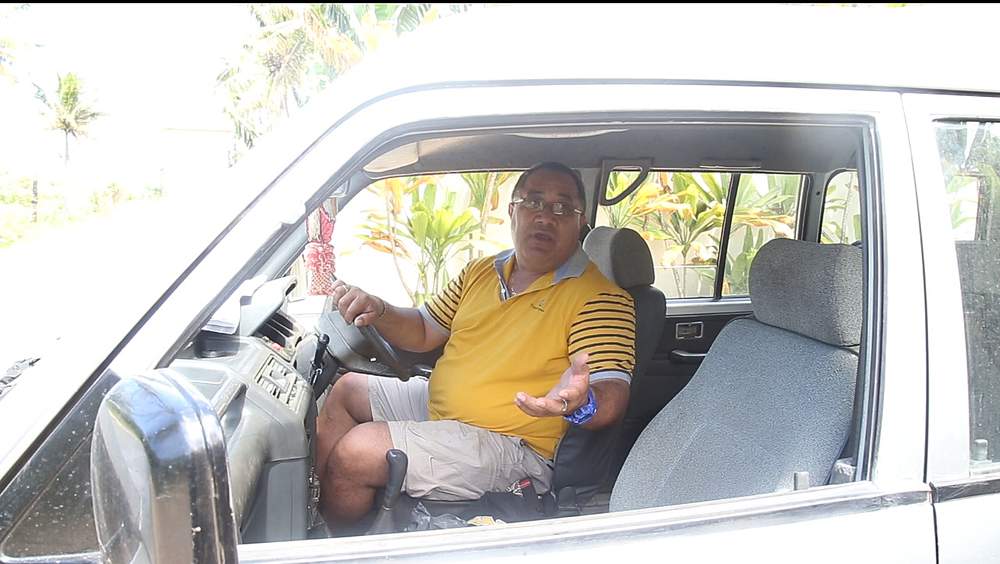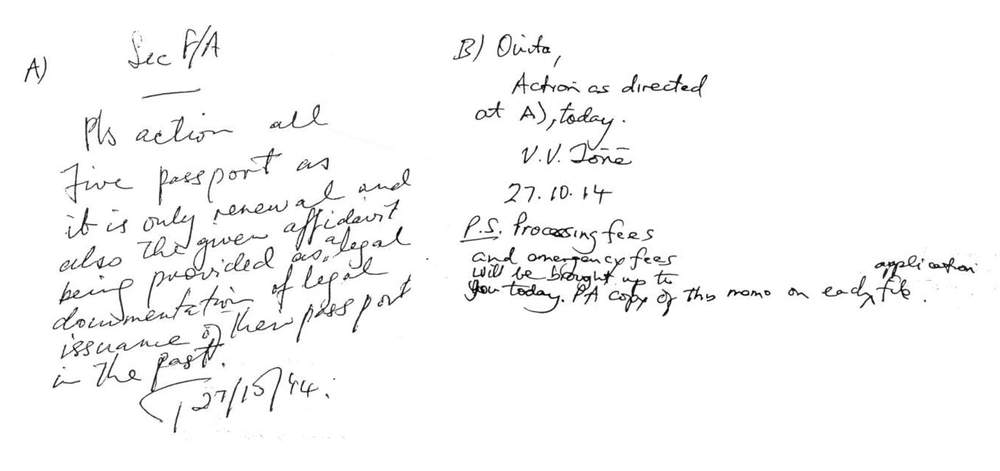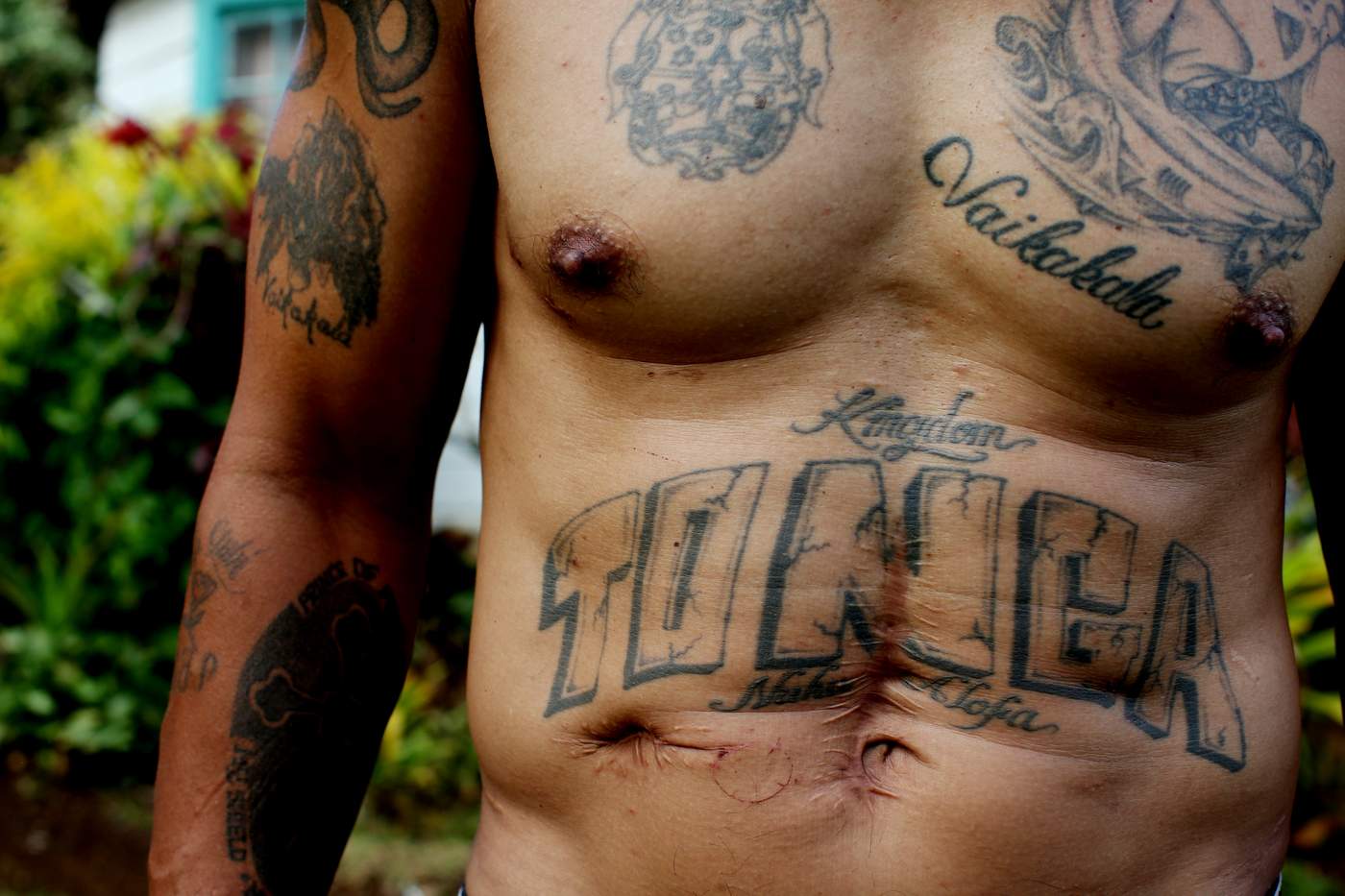On mornings when the Tongan Parliament sits in Nuku’alofa, a Nissan 4WD swings past the beefy security guard at the front gates and rolls into an allocated park.

The driver, a fat man with glasses wearing traditional garb, chats with fellow members of the legislature until 10am, when he walks inside the white, wooden, church-like building where Tonga's laws are passed.
That Malakai Fakatoufifita, a noble of the realm known as Lord Tu’ilakepa, can take his seat in the legislative assembly is seen by many as an outrage.

Lord Tu’ilakepa
Because when Tu’ilakepa was Speaker of the House in 2010, he allegedly accepted bribes from a Colombian drug boss named Obeil Antonio Zuluaga Gomez.
Gomez wanted to use Tonga as a hub for a global conspiracy to ship hundreds of kilograms of cocaine to Australia and China, according to Australian Federal Police.
Tu’ilakepa had never met Gomez but wrote a letter to the head of the Immigration Department offering to sponsor him so he could get an urgent visa to come to Tonga.
"I can also vouch that [he] is an honest, trustworthy and law abiding person," Tu’ilakepa wrote in the letter, which is part of Australian court files. In fact, Gomez had done jail time for drug trafficking.
Tu’ilakepa was arrested and charged with conspiring to import drugs and unlawful possession of firearms after guns were found at his properties.

(Photo courtesy of the Kele'a newspaper)
The case dragged on for years before the Attorney General, ‘Aminiasi Kefu, announced he was dropping the drugs charges because of their complexity and because phone taps by Australian police were inadmissible under Tongan law.
Kefu told media it would have taken two months to listen to the phone recordings and a jury would find it difficult to understand and “overbearing” to sit through.
“They may acquit him on that, and all that effort will result in nothing. We are more confident on pursuing the arms charges, which is more...an open and shut case,” Kefu said.
Tu’ilakepa, a father of six, eventually pleaded guilty to the weapons charges and last year was fined just over $6000.
If he'd been sentenced to two years or more imprisonment, he would have been stripped of his noble entitlements - instead he paid the fine and remains a member of the Tongan legislature.
We wanted to ask Tu’ilakepa why he wrote the letter and what right he has to represent the Tongan people, but he avoided us, hiding his face from the photographer.

He then complained in Parliament that we were harassing him. When we finally caught up with him as he left a plantation outside Nuku’alofa, he said he was angry we'd gone to his home and had no comment.

"It's strange," admits Tonga's Prime Minister, ‘Akilisi Pohiva, of Tu’ilakepa's continued presence in Parliament.
"But the constitution gives the power to the nobles to elect their own representatives. He should not be elected to Parliament for obvious reasons, yet he was."

‘Akilisi Pohiva
And that goes to the heart of Tonga's problems - it has a Prime Minister who is determined to stamp out corruption and abuse of power but is stymied by a constitution that continues to protect the nobility.
Under the constitution, only 17 of the 26 members of Parliament are appointed by the people, the remainder by nobles.
Ultimate power is held by the King’s advisors on the Privy Council.
"This whole democracy thing is bullshit," says Mateni Tapueluelu, a people's representative in the legislature and Pohiva's son-in-law.
He believes there is a "network of corrupt top people" covering for each other and the "big fish" can't be touched.
Experts say unless Tonga cleans up its act, it will remain a target for international crime groups, threatening the stability of the region and opening up places like New Zealand and Australia to activities such as drug smuggling, money laundering and people trafficking.
Jeremy Douglas of the United Nations Office on Drugs and Crime says organised crime is the number one issue facing Pacific law enforcement agencies, as large quantities of meth and cocaine are shipped through the region.
Public officials in the Pacific are poorly paid, he says, and therefore relatively easy to corrupt with "mass volumes of money".
Grant O'Fee, a New Zealander who served as Tonga's police commissioner from 2012 to 2014, can understand why civil servants might accept bribes in a country so reliant on foreign aid.
"It's easy to ride in on your big white horse and say 'stop taking bribes off motorists', but if you're getting paid 5000 paanga a year...look at the condition the poor buggers are living in."
Intelligence sources say Tonga is at risk because it has an international airport, a unique nobility structure susceptible to corruption, a large Chinese population, and criminal ties to Australia, New Zealand and the US.
That's the official view, but what's the word on the street?
A good person to ask is Sione Ngaue, who runs a tattoo parlour in downtown Nuku’alofa.
A former member of the notorious west Los Angeles street gang the Raymond Avenue Crips, Ngaue was deported to his birthplace of Tonga in 2008 after serving 14 years jail-time for manslaughter.
His body is covered in scars from gunshot and knife wounds inflicted during gang wars.
Ngaue had a hard time transitioning to life in Tonga, the homeland he left when he was just four. Deportees carry a lot of the blame for Tonga's growing crime problem, he says.
Ngaue used to work for his "big time drug dealer" brother in LA, and says if he hadn't turned his life around, he could easily go back to that lifestyle.
"If I was gonna import drugs to Tonga I think I would either fly it through in a small plane, coming from Samoa or somewhere like that, and drop it off and have the little boats pick it up.
"It's so easy in Tonga because the Government is so corrupt. It's easy to pay off [officials] and they turn their back.
"We're Tongan nationals but we're really Americans, that connection never breaks, it's so easy for my deportee brothers and sisters to make a phone call...we still have a lot of family and friends and homeboys who are in the gangs there who will support us."

Upon his return to Tonga, Ngaue was surprised to see so many Chinese. They now make up about four percent of the population, or 4000 people, and China has increasingly been throwing money around - including a $140m loan to rebuild Nuku’alofa after the 2006 riots.
Ngaue believes Chinese-Tongans are behind a lot of the meth, or "ice" shipments coming into the country.
"I don't see the cocaine here in Tonga like I see the ice. A lot of kids are getting involved, which is a bad thing - it's very expensive here."

Dr Pulaka Mapa knows about the fallout from drugs on Tonga's young people.
We found him addressing a small crowd in a market square about mental health issues.
Mapa says about 60 per cent of psychiatric admissions to Tonga's main hospital are drug-related.
"It's getting worse because we can't … do much about the supply of it.
"Deportees contact their friends overseas and they send it here. I was told the Chinese are also involved.
"Go to the nightclubs. They are sniffing it in the toilets."
To understand more about Tonga's connection to international drug syndicates, we spoke to Alamoni Liava’a, the former captain of the Tongan rugby team who became a cocaine smuggler in the 1990s, bringing millions of dollars worth of the drug to New Zealand inside yams.
We tracked Liava’a down to a hut on the remote western tip of Tongatapu, where he lives like a hermit in the bush.
Initially he only wanted to talk about rugby, but soon opened up about his drug-dealing past, sharing secrets he'd never before divulged.
Liava’a revealed that his Colombian cocaine was shipped from San Francisco to Hawaii to Tonga before the final journey to New Zealand, and that his contact was the notorious Hawaii-based Tongan drug boss Richard "Tiki" Taumoepeau.
Taumoepeau was responsible for a lot of the cocaine that flooded the Pacific, including New Zealand, in the late 90s. He was arrested in 1999 and is serving a 40-year sentence in a US jail.
"He was our guy, don't tell the police that," Liava'a chuckles.

He was just starting to hit the big-time, he says, when he was caught.
"The American [authorities] didn't worry about it because we were only doing suitcases, they were worrying about the guys with the containers. But we were starting to spread - we were going to Japan, Guam, Sydney, Fiji, Samoa."
In more recent times, Tongans have been cropping up in large methamphetamine operations.
Old friends Mosese Uele and Yixin Gan, who grew up in Tonga, were key players in an ingenious plot to bring hundreds of kilos of cold pills for meth production from China to New Zealand.

Yixin Gan appearing at the High Court in Auckland (BEVAN READ/FAIRFAX NZ)
Gan, a former top student at Tongatapu's Liahona High School whose family still runs a shop in Nuku’alofa, ran a legitimate business shipping food from China to Pacific islands, with a short stop in New Zealand.
She realised that because the shipments were shown as goods in transit they wouldn't be inspected by Customs, instead being held in a secure area at Auckland Airport.
It just so happened Uele had a freight company that gave him access to the Customs-controlled area, where he was able to swap the boxes containing pseudoephedrine, labelled "starch", for legitimate potato starch.

Mosese Uele
Using this method, Gan brought hundreds of kilos of Contac NT into New Zealand and her bank accounts went from very little to $7m in a short space of time. She was sentenced to 14 years jail in October.
Uele, who received just $60,000 for his part, has served his time and returned to his family home in West Auckland.
In another high-profile case in June, three Tongan Aucklanders were arrested along with a Hong Kong-born man after almost 500 kilograms of meth, worth an estimated half a billion dollars, was brought ashore at 90 Mile Beach.

Pictures supplied by police of the 494 kg meth bust on 90 Mile Beach.
Sources allege the drugs came from China on board a fishing boat before being dropped in New Zealand waters.
Although there is no evidence of a direct link to Tonga in the 90 Mile Beach operation, Prime Minister Pohiva says the involvement of Tongans is of concern.
"That is why we have a police commissioner from New Zealand, funded by the New Zealand Government...to look into all these serious cases, including drug trafficking," he says.
Pohiva told the United Nations General Assembly in September that Tonga was being subjected to an "onslaught of transnational crime".

On a visit to New Zealand in July he said the illegal sale of Tongan passports was a continuing problem and alleged holders of diplomatic passports may have trafficked millions of dollars worth of drugs into Aotearoa.
Passports are something Pohiva knows a thing or two about. Way back in 1989 he sued the Government for illegally selling hundreds of Tongan passports to foreigners to raise cash.
His case failed when the late King Tupou IV ignored public anger and allowed the law to be changed to retrospectively legalise the sales.
More than a quarter of a century later an exasperated Pohiva sits in a boardroom in his office opposite Parliament and laments that Tongan passports are still being sold by corrupt officials to the highest bidder.
Rail thin with a shock of white hair, the 75-year-old has been an MP since 1987 and has spent his career campaigning for democracy. Over the years he was thrown in jail and charged with sedition, but in 2014 he became the first commoner to be elected Prime Minister.

Pohiva, pictured in 2012. (MARK TAYLOR/FAIRFAX NZ)
He entered office as a reformer but has run up against roadblocks.
Pohiva says he is frustrated that, despite a police taskforce being formed last year to investigate the passport issue, so far only lower level officials have been arrested.
When pressed, Pohiva is unable to provide evidence that Tongan passports are being used to smuggle drugs, but he says the issue remains under investigation.

Former PM Lord Tu'ivakano appears in 2014 to have approved the passport renewal applications of five people for whom no records of naturalisation to Tonga could be found. (Documents provided by Kele'a newspaper)
He says he has documents showing that his predecessor, Lord Tu’ivakano, signed off on five passports for Chinese people in October, 2014, when he was Prime Minister, despite concerns there was criminal activity behind the applications.
"To me, that was an illegal, unlawful action taken by the previous Government," Pohiva says, and Crown Law should act.
"I hope they will all be taken to court."

Former Prime Minister Lord Tu'ivakano
Tu’ivakano, the current Speaker of the House, says he did nothing wrong by recommending the passports be issued as they were simple renewals, and the allegations are politically motivated.
We spoke to a former immigration officer who was jailed for giving two blank passports to a woman who'd offered him $30,000 for the documents.
He revealed that Pohiva had visited him prior to his election as Prime Minister, digging for dirt on whether higher-ups were involved.
"I worried about if I give the information to him then maybe he will use that...for his election."
The man says he acted on his own, but knows the names of senior officials who've done the same. He fears for his family's safety and wants protection before he gives details.
"If I give you some of the names of the people, who knows, maybe they will send someone to wipe us out."
Mateni Tapueluelu, the MP, says the official passport inquiry is a sham.
"It's like a cover. They're trying to show that they are doing something about it by arresting the small people, [but they're] not touching the real decision makers behind the scene," he says.
"We know who they are. It has been raised time and time again. They just can't do anything about it. Respect for people runs higher than the respect for truth."

Lord Fusitu’a, chairman of Parliament's standing committee on anti-corruption
Lord Fusitu’a is an Australian-educated lawyer who is chairman of Parliament's standing committee on anti-corruption, the first of its kind in the Pacific.
He’s been frustrated in his attempts to have a permanent anti-corruption commissioner appointed.
The role needs to be filled urgently, he says.
"Sixty per cent of local businesses have stated that they will have to pay at least one bribe a year.
"To me, that doesn't seem acceptable. In an economy our size it shouldn't be too hard to stamp out corruption."
Fusitu’a wants the constitution amended so that political impeachment cases go to the anti-corruption commissioner rather than be decided by a show of hands in Parliament.
"All you need is enough mates in the house and you can get away with anything."
Journalist and activist Kalafi Moala, who worked alongside Pohiva campaigning for democracy and served as his press secretary for a time, is saddened that, in his opinion, corruption is as bad as ever in Tonga.
"The excuse has been that we're a poor nation. But...when you look at the evidence, there are people that are working, they get well paid and they're still corrupt," Moala says.
He quit working for Pohiva in frustration at a lack of progress.
"Pohiva was a tremendous Opposition leader...but he has difficulty governing. Since he became Prime Minister he seems to find it very difficult to bring about those reforms that he'd promised."
But Moala says all is not lost.
"Maybe we're judging Tonga too quickly, we've only had six years of democracy."
Pohiva says it took him 40 years to realise his dream of a parliamentary system where the people have a say. About 80 per cent of his political reforms have gone through, he claims, but it usually takes two terms for a Government to achieve its aims.
He uses the Japanese term for covert agents to describe the forces at work inside Tonga.
"They come like ninjas. They come and they multiply. We lack the mechanism to destroy all these ninjas. I think the problem is to kill the mother and father - if not, they will continue to multiply."







